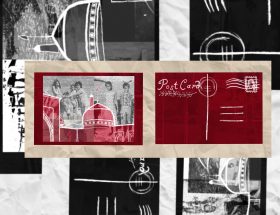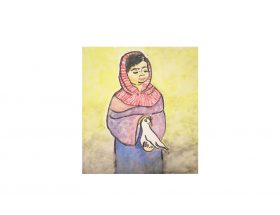In keeping with the theme ‘branches of love’, this piece was initially conceived as an exploration of the love many of us feel for our mothers, and how it is capable of being something entirely different to any other form of love we will experience.
I was inspired to write this when thinking about the way many people I know speak of their mothers, and indeed the way I myself speak of my mother. I find myself talking about my mother in very idealistic terms, often describing her as ‘the strongest woman I know’. Many of my friends say similar things about their mothers, using superlatives in a way that doesn’t sound flippant or light-hearted. We truly believe our mothers are the best, the strongest, the kindest, the most loving. This is incredibly beautiful, especially as the friends I am talking about are almost all female. A girl’s relationship with her mother is typically seen as tense, fraught and full of conflict. In media it is portrayed as loving but often aggressive and easily damaged by either of the two women. Films such as Ladybird and Steel Magnolias explore the relationships between mothers (and mother-like figures) and their daughters with honesty and compassion and refuse to shy away from the often harsh reality of such a close female relationship.
Now that I am 21, I am becoming gradually more aware of how much I mistreated my mother growing up. Like many teenage daughters (or at least, many teenage daughters in pop culture) I often behaved terribly towards my mum. I saved my most selfish, most brutal, must insensitive moods for her. Perhaps what was even worse than this was the fact that I would never dream of treating someone else in the same way. I wish I could apologise properly for the way teenage me treated my mum, but I think that it is hard for me at this age to really make up for what I put her through. I have always had the shortest temper when dealing with her, and all of the cruellest, most unkind words that have left my mouth were directed at her.
Of course, she would fight back. As her daughter she held me to a higher standard than anyone else, and she wanted me to exceed her in every way. She wants me to be kinder, more selfless, more hard-working than she was, and she wants me to care about my studies and my artistic talents because she feels she neglected hers. She wants me to be healthier and, most of all, she wants me to be happier. I was able to perceive all these wants from a fairly young age, but I wasn’t able to fully understand them. I decided that my mum didn’t like me very much; this was the easiest reason for her to be so critical of me, and so it was my accepted reason. I fought back – I was deliberately unkind to her, disobedient, and different to her. I would choose different books to those she recommended, wore clothes that she didn’t like, neglected the academic subjects that she wanted me to excel in. Then over time, I began to read the books she always talked about. I surprised myself by loving them. I have started wanting her approval on any clothes I buy, which is the opposite of 15-year-old me who would deliberately pick clothes she would disapprove of, thinking that her disapproval made them cooler. I want to make her proud, which is something I have always wanted, but I now understand that her pride in me will be harder to achieve than someone else’s because her standard for me has been set so high. And if I ever felt criticised by her, or misunderstood, I always felt an overwhelming, unimaginable amount of unconditional love. Again, it has taken me some time to understand the value of that.
My mother adores my brother, and I know she thinks my father is the best human she could ever meet. We both make fun of their selfless caring nature, but when it comes down to it, she always tells me to be more like my father. She’s right, there’s a lot I can learn from him and I hope to become like him in many ways. But she doesn’t give herself enough credit. She doesn’t hold herself up as a hero for her children, she doesn’t consider the fact that she is the person I want to be most like. I wish she could see herself as I do. As a child, as a teen, I couldn’t see past our similarities and I resented her for wanting me to be better. But now I cling to anything we have in common, and I want to be the person that she thinks I can become.
The purpose of this piece was not to attempt to prove that my mum is, indeed, the strongest woman in the world. It was to point out that for those of us lucky enough to have mothers that we can view in such a positive light, it is truly a beautiful thing that we are still able to hold up as our hero this woman that we know better than anyone else in the world. We see her at her weakest and her strongest, we often put her flaws under a magnifying glass (as children tend to do with their parents), but we still place her on a pedestal that she is unlikely to fall from, because after all, we know her too well to falsely idolise. My mother would object to me devoting a whole piece to her, and will surely list all the more worthy candidates for my admiration. She’s missing the point. I’m so lucky to have such an empowered woman as my mother, so there’s no one more deserving of my appreciation and respect.




